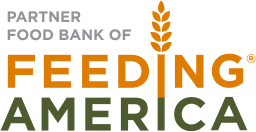By Amber Wright, Development and Marketing Coordinator
At The Foodbank, we believe in the power of change, especially as it relates to people reentering the workforce. That’s why we’re proud to be a Fair Chance Employer and supporter of workforce development. We provide opportunities for individuals with justice system involvement to reintegrate into the workforce and build brighter futures. Here’s how we support reentry work and empower our employees every step of the way:
- The Foodbank is a Fair Chance Employer
At The Foodbank, inclusivity isn’t just a buzzword – it’s a fundamental part of who we are. Currently, 42% of our staff have been impacted by the justice system, and we’re working towards increasing that number to 50%. We have formed relationships with organizations like Montgomery County Probation Services to get referrals for job candidates, along with community centers like the Hope Zone, which routinely interacts with system-impacted citizens.
Understanding the challenges that come with reentering the workforce, we offer allowances for probation visits and maintain flexible work schedules to accommodate our employees’ needs. Additionally, we provide equitable wages and benefits, including free healthcare, free life insurance, retirement plans, and paid time off, ensuring that our workers can support themselves and their families. We even offer extras like a free weekly yoga class and book club.
- The Foodbank Provides Extra Support to Overcome Barriers
We recognize that reentry comes with its own set of challenges, which is why we go the extra mile to help our employees succeed. Through financial literacy and conflict resolution classes, we equip our team members with essential life skills to navigate their personal and professional lives with confidence. We also provide a clothing stipend not only to help our employees dress for success and maintain a professional appearance but also to provide safety equipment like steel-toe boots.
With an onsite social worker and a strict no-alcohol policy at all functions, we prioritize the safety and well-being of our employees, creating a supportive work environment where everyone can thrive. We also promote group activities and celebrations so employees can form relationships with people outside of their department.
Our connected culture fosters a secondary peer support system, ensuring that no one faces their challenges alone. This is seen when employees step up to bring coworkers to a 12-step meeting (like Alcoholics Anonymous) in a time of crisis and when employees volunteer to give rides to a coworker who just lost a car. These supports cannot be mandated, but they happen naturally in a healthy work environment where basic needs are met, and relationships are fostered.
- The Foodbank is Committed to Providing Training and Education for Workforce Development
At The Foodbank, we’re not just offering jobs – we’re investing in the futures of our employees and the communities they live in. The ripple effect of employing system-impacted people is that their families are better supported, more taxes are being paid, and more work is being done to keep the economy running smoothly.
Job training is provided to enhance skills and employability for individuals reentering the workforce. We believe in empowering our employees to reach their full potential, which is why we offer cross-training opportunities, promote from within, and provide an educational stipend to support further learning or certification, even outside of our field. By investing in our employees’ growth and development, we’re building a stronger, more resilient workforce for the future.
- The Foodbank Provides Opportunities and Advocates for People Outside of Our Staff
Our commitment to job training and outreach doesn’t end at our door. One of our initiatives is working with the Dayton Equity Center to provide free forklift training to their clients. By providing the space and equipment, we are making this training possible for people who might not have the option otherwise. This helps strengthen our workforce by providing skilled candidates for crucial warehouse jobs.
We also work with the probation department and the MonDay program to fulfill mandated volunteer requirements. These agencies send individuals with community service requirements to help us with things like passing out food in our Drive Thru and other tasks around our warehouse. This mutually beneficial arrangement allows people to meet those requirements while also providing a real-life example of a job opportunity for people with criminal records, and sometimes even outreach from our employees who remember being in the same position.
- The Foodbank Works to Remove Barriers for System-Impacted Community Members
This year we have added certified Community Health Workers to our team. They are trained to connect people with resources offered by government agencies, non-profits, and other Community-Based Organizations in our area. While their services are not strictly reserved for system-impacted individuals, they have gone the extra mile to address many of the barriers they face. For example, we send some of our staff inside the Dayton Correctional Institution to help incarcerated women get signed up for SNAP benefits before they are released.
For the people already released, our Community Health Workers remain ready to connect them to commonly needed resources. They can refer people to legal help to get records expunged or even services to help get their license reinstated, widely expanding their job opportunities. The fewer barriers people face when reentering society or the workforce, the better chance they have of becoming their best selves for their families and community.
Advocacy is another way we work to support people reentering the workforce. Last year, we expanded our mission to address the social determinants of health and the conditions causing people to turn to us for food. Much of this work sits in the space of reentry, and our Strategic Initiatives team works hard to address the rights of this demographic, as well as other underserved groups. Just recently, our Director of Strategic Initiatives, Mary Evans, spoke on this issue in an article published in the Dayton Daily News – “VOICES: System-impacted people need a fair chance, not a second chance.”
Conclusion
At The Foodbank, supporting reentry work isn’t just a program – it’s a passion. We are proud to provide opportunities for individuals to rebuild their lives and contribute positively to our community. Join us in our mission to create a brighter, more inclusive future for all.



No comment yet, add your voice below!